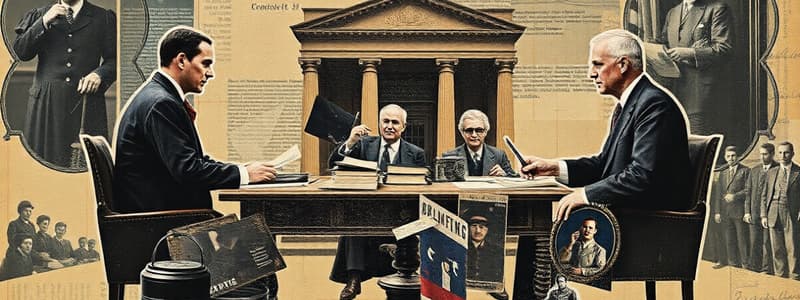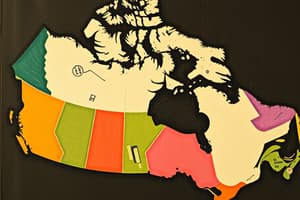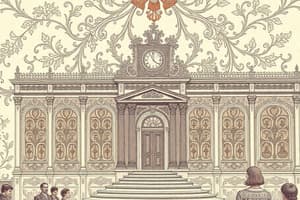Podcast
Questions and Answers
What is required for an accused person to be found guilty in a Canadian court?
What is required for an accused person to be found guilty in a Canadian court?
- They must confess to the crime.
- They must be guilty beyond a reasonable doubt. (correct)
- They must be proven guilty with clear evidence.
- They must be implicated by a witness.
Who is responsible for appointing judges to the Superior and Federal Courts in Canada?
Who is responsible for appointing judges to the Superior and Federal Courts in Canada?
- The Canadian Bar Association.
- The federal government. (correct)
- Provincial governments.
- The Supreme Court of Canada.
What is one of the judge's key responsibilities during a trial?
What is one of the judge's key responsibilities during a trial?
- To represent the Crown in prosecution.
- To initiate criminal charges.
- To provide legal counsel to the defense.
- To hear the evidence and decide the verdict in cases without a jury. (correct)
What role do Crown prosecutors play in the adversarial system?
What role do Crown prosecutors play in the adversarial system?
What must defense attorneys do in regard to the accused?
What must defense attorneys do in regard to the accused?
What is the main responsibility of a court clerk?
What is the main responsibility of a court clerk?
How many jurors are typically selected to serve on a jury?
How many jurors are typically selected to serve on a jury?
Which of the following individuals is exempt from serving on a jury?
Which of the following individuals is exempt from serving on a jury?
What is a key qualification for someone to be eligible to serve as a juror?
What is a key qualification for someone to be eligible to serve as a juror?
What is the role of the sheriff in the court system?
What is the role of the sheriff in the court system?
Which of the following statements regarding juror screening is false?
Which of the following statements regarding juror screening is false?
Which condition does not disqualify someone from jury duty?
Which condition does not disqualify someone from jury duty?
What is the process of selecting jurors called?
What is the process of selecting jurors called?
What is the primary responsibility of the Crown in a trial?
What is the primary responsibility of the Crown in a trial?
Which type of evidence is directly based on witness testimony?
Which type of evidence is directly based on witness testimony?
What is the main goal of the defense during a trial?
What is the main goal of the defense during a trial?
What is a voir dire?
What is a voir dire?
What consequence may a subpoenaed witness face for failing to appear in court?
What consequence may a subpoenaed witness face for failing to appear in court?
During examination in chief, what type of questions are prohibited?
During examination in chief, what type of questions are prohibited?
What happens to witnesses in a courtroom before they testify?
What happens to witnesses in a courtroom before they testify?
What is the potential penalty for a witness who knowingly gives false evidence?
What is the potential penalty for a witness who knowingly gives false evidence?
What type of evidence shows the accused has committed similar offences to establish a pattern of behavior?
What type of evidence shows the accused has committed similar offences to establish a pattern of behavior?
Which type of evidence is based on the observations of an expert witness?
Which type of evidence is based on the observations of an expert witness?
When can law enforcement officials charge a witness with a crime based on their testimony?
When can law enforcement officials charge a witness with a crime based on their testimony?
Which of the following is considered privileged communication?
Which of the following is considered privileged communication?
What is hearsay evidence?
What is hearsay evidence?
What might a judge do with photographs that are meant to inflame the jury?
What might a judge do with photographs that are meant to inflame the jury?
What type of evidence may the defence introduce to generate sympathy for their client?
What type of evidence may the defence introduce to generate sympathy for their client?
What occurs if a person who received privileged communication chooses to disclose that information?
What occurs if a person who received privileged communication chooses to disclose that information?
What is the purpose of a challenge for cause in jury selection?
What is the purpose of a challenge for cause in jury selection?
Which type of jury challenge is based on a 'gut feeling' of a lawyer?
Which type of jury challenge is based on a 'gut feeling' of a lawyer?
What happens if a jury cannot reach a unanimous verdict?
What happens if a jury cannot reach a unanimous verdict?
Which of the following challenges is used when the jury list itself is considered biased or fraudulent?
Which of the following challenges is used when the jury list itself is considered biased or fraudulent?
What limitations exist for peremptory challenges in serious criminal cases?
What limitations exist for peremptory challenges in serious criminal cases?
What must jurors do after being selected for jury duty?
What must jurors do after being selected for jury duty?
Why might a jury be sequestered during a trial?
Why might a jury be sequestered during a trial?
Which of the following is NOT a valid reason for a challenge for cause?
Which of the following is NOT a valid reason for a challenge for cause?
What is required for surveillance devices to be used legally?
What is required for surveillance devices to be used legally?
Why are polygraphs not admissible as evidence in court according to the Supreme Court?
Why are polygraphs not admissible as evidence in court according to the Supreme Court?
What characterizes a confession in the context of a crime?
What characterizes a confession in the context of a crime?
What occurs after all witnesses have given their testimony in a trial?
What occurs after all witnesses have given their testimony in a trial?
What is the role of the judge after the summations in a trial?
What is the role of the judge after the summations in a trial?
Flashcards
Adversarial System
Adversarial System
A legal system where two opposing sides present their arguments in court, aiming to prove their case.
Accused
Accused
The person accused of committing a crime.
Crown Prosecutor
Crown Prosecutor
A lawyer who represents the government in criminal cases. They try to prove the accused's guilt.
Defense Counsel
Defense Counsel
Signup and view all the flashcards
Supreme Court of Canada
Supreme Court of Canada
Signup and view all the flashcards
What does a court clerk do?
What does a court clerk do?
Signup and view all the flashcards
What is the role of a court recorder?
What is the role of a court recorder?
Signup and view all the flashcards
What are the duties of a sheriff in court?
What are the duties of a sheriff in court?
Signup and view all the flashcards
What is a jury?
What is a jury?
Signup and view all the flashcards
What is empanelling?
What is empanelling?
Signup and view all the flashcards
What is a jury panel?
What is a jury panel?
Signup and view all the flashcards
Who is exempt from jury duty?
Who is exempt from jury duty?
Signup and view all the flashcards
What is the screening process for potential jurors?
What is the screening process for potential jurors?
Signup and view all the flashcards
Challenge of Jury List
Challenge of Jury List
Signup and view all the flashcards
Challenge for Cause
Challenge for Cause
Signup and view all the flashcards
Peremptory Challenge
Peremptory Challenge
Signup and view all the flashcards
Jury Challenge
Jury Challenge
Signup and view all the flashcards
Jury Selection
Jury Selection
Signup and view all the flashcards
Jury Verdict
Jury Verdict
Signup and view all the flashcards
Hung Jury
Hung Jury
Signup and view all the flashcards
Jury Sequestration
Jury Sequestration
Signup and view all the flashcards
What is a polygraph test?
What is a polygraph test?
Signup and view all the flashcards
What is a confession?
What is a confession?
Signup and view all the flashcards
What is a summation?
What is a summation?
Signup and view all the flashcards
What is a judge's charge to the jury?
What is a judge's charge to the jury?
Signup and view all the flashcards
What is a challenge to the charge?
What is a challenge to the charge?
Signup and view all the flashcards
Self-Incrimination
Self-Incrimination
Signup and view all the flashcards
Privileged Communication
Privileged Communication
Signup and view all the flashcards
Similar Fact Evidence
Similar Fact Evidence
Signup and view all the flashcards
Hearsay Evidence
Hearsay Evidence
Signup and view all the flashcards
Opinion Evidence
Opinion Evidence
Signup and view all the flashcards
Character Evidence
Character Evidence
Signup and view all the flashcards
Photographs as Evidence
Photographs as Evidence
Signup and view all the flashcards
Polygraph Evidence
Polygraph Evidence
Signup and view all the flashcards
Direct Evidence
Direct Evidence
Signup and view all the flashcards
Circumstantial Evidence
Circumstantial Evidence
Signup and view all the flashcards
Raise Reasonable Doubt
Raise Reasonable Doubt
Signup and view all the flashcards
Directed Verdict
Directed Verdict
Signup and view all the flashcards
Examination in Chief
Examination in Chief
Signup and view all the flashcards
Cross Examination
Cross Examination
Signup and view all the flashcards
Subpoena
Subpoena
Signup and view all the flashcards
Perjury
Perjury
Signup and view all the flashcards
Study Notes
Trial Procedures in Canada
- Trial procedures in Canada are based on the adversarial system, where two or more opposing sides present and argue their case in court.
- For an accused person to be found guilty, a judge or jury must find them guilty beyond a reasonable doubt.
- Canadian courtrooms involve several participants, including the accused, defense counsel, Crown prosecutor, witnesses, a judge, a jury, a court recorder, and members of the public.
Judges
- Judges are often called "the Bench" or "the Court."
- Federal government appoints judges for Superior, Federal, and Supreme Courts.
- Provincial governments appoint judges and justices of the peace.
- Lawyers or law professors with at least 10 years' experience can be judges.
Judge's Responsibilities
- Judges must act impartially during trials, bail hearings, and preliminary hearings.
- They ensure proper procedures and court rules are followed.
- If there's no jury, the judge hears evidence and decides the verdict.
- Judges also rule on motions, including whether to admit evidence.
Lawyers
- Lawyers represent the government (Crown) and the accused (defense).
- Crown prosecutors (or Crown attorneys) try to convict the accused; they have powers to lay or withdraw charges.
- Defense attorneys defend accused persons against charges, regardless of severity.
Other Court Officials
- Court Clerk: Reads charges, swears in witnesses, handles evidence and paperwork.
- Court Recorder: Sits near the witness box, records testimonies word for word.
- Sheriff: Assists the judge, finds prospective jurors, organizes and secures the court.
Juries
- Juries decide serious indictable offenses.
- Jurors are randomly selected.
- A jury panel of 12 people are chosen through the process called empaneling.
- If a case is controversial, the number of potential jurors in the panel might increase.
Juror Qualifications
- Must be a Canadian citizen, at least 18 years old.
- Resident of the relevant province or territory for at least a year.
- Fluent in English or French.
- Mentally competent.
Jury Duty Exemptions
- Politicians, judges, lawyers, law students, doctors, coroners, and veterinarians.
- Law enforcement officers and their spouses.
- Individuals with visual impairments and certain mental/physical disabilities.
- People who have served on a jury in the past two to three years.
- Anyone convicted of an indictable offense without a pardon.
- People who can convince the court of a specific reason for an exemption (e.g., illness).
Screening Potential Jurors
- Crown and defense ask questions to potential jurors:
- Canadian citizenship, language fluency, prior convictions, occupations, disabilities, and recent jury duty.
Jury Challenges
- Three types of challenges to eliminate jurors: -Challenge to the jury list (rarely used, for proving fraud or bias)
- Challenge for cause (based on juror bias)
- Peremptory challenge (based on lawyer's intuition, with limits based on the severity of the crime)
Jury Duty Processes
- Sworn jury members are expected to honestly arrive at a verdict.
- Jurors can't discuss the case with others outside the jury, follow media reports or disclose deliberations following the trial's end.
- Verdict must be unanimous; otherwise, it's a hung jury.
- In controversial cases, juries can be sequestered.
Presenting Evidence
- Presenting evidence is crucial in any trial.
- Evidence includes Crown evidence, defense evidence, witness testimonies, rules of evidence and self-incrimination.
Crown Evidence
- Since the onus is on the Crown, it presents evidence against the accused.
- Direct evidence (witness testimony) and circumstantial evidence (indirect evidence linking the accused to the crime).
Defense Evidence
- Defense's priority is to raise reasonable doubt, not to present evidence.
- Defense may request a directed verdict if the Crown's case isn't strong enough.
- Defense often relies on witness testimony to counter Crown evidence.
Questioning
- Examination in chief: direct questions to ones’ own witness.
- Leading questions are disallowed.
- Cross-examination: questions asked by opposing lawyers to opposing witnesses.
Witnesses
- Witnesses generally appear voluntarily, but can be subpoenaed.
- Refusing to appear can result in fines or imprisonment.
- Witnesses are excluded from the courtroom until they testify to limit external influence.
- False statements by a witness may lead to perjury charges and prison sentences.
Rules of Evidence
- Admissibility of evidence is governed by the Canada Evidence Act.
- A voir dire (a hearing within a hearing) can be ordered to determine if questioned evidence is admissible.
- The jury is excluded during a voir dire.
Self-Incrimination
- The Charter protects witnesses from self-incrimination.
- Witnesses can refuse incriminating questions.
- Perjury is the only exception to this protection.
- Law enforcement can charge a witness with a crime if their testimony suggests guilt.
Types of Evidence
- Common types of evidence: privileged communication, similar fact evidence, hearsay evidence, opinion evidence, character evidence, photographs, electronic devices, polygraph evidence, confessions.
Privileged Communication
- Confidential communications (e.g., lawyer-client, doctor-patient) are protected and not admissible in court.
- The recipient of the privileged communication, if they choose to disclose it, can be charged with an abuse of position.
Similar Fact & Hearsay Evidence
- Similar fact evidence shows a pattern of similar past offenses, establishing behaviour.
- Hearsay is information repeated by a third party, not from direct experience.
Opinion & Character Evidence
- Opinion evidence is based on an expert's observations.
- Character evidence indicates the likelihood of the accused committing the crime but can be used by the Crown to question the accused's character.
Photographs & Surveillance
- Photographs are admissible if accurate representations of the crime scene.
- Judges may exclude photos meant to inflame the jury.
- Surveillance requires court authorization.
Polygraphs & Confessions
- Polygraph tests (lie detector tests) measure physiological changes and aren't admissible in court.
- Police may use polygraphs for investigations.
- Confessions are admissible if voluntary
Summation & Charge to the Jury
- Crown and defense provide summations outlining key arguments and evidence.
- Judge delivers a charge (explanation) to the jury of relevant facts and applicable law.
- Jury weighs evidence; the judge's charge can be challenged.
Studying That Suits You
Use AI to generate personalized quizzes and flashcards to suit your learning preferences.




